Bios
The Feminist Wire celebrates a multiplicity of feminist expressions from a variety of editors and writers that span genders, sexualities, professions, incomes, races, ethnicities, abilities, ages, and geographies.
Tamura Lomax received her Ph.D. from Vanderbilt University in Religion where she specialized in Black Religious History and Black Diaspora Studies. She also developed expertise in Women, Gender, and Sexuality Studies and Black British and U.S. Black Cultural Studies. She is specifically interested in the ways that linguistic and representational technologies of power construct and institutionalize ideas of race and gender and how these ideas not only establish notions of innate difference, but ultimately affect Black diasporic people in general and Black women and girls specifically in their everyday lives, sometimes igniting epistemic and/or material violence. Her scholarship interrogates these intersections by placing special emphasis on North American slavery, Black social movement, religion, and popular culture.
In 2011, she co-founded The Feminist Wire (TFW), an online publication committed to feminist, anti-racist, and anti-imperialist socio-political critique. Today, Dr. Lomax is the CEO and visionary for TFW. Her vision is to create space for justice work through critical conversation, exchange, mass-mediation, and dynamic accessible education. Her hope is to bring academic expertise to the streets and vice versa. Since its founding, TFW has published close to 3,000 intersectional and justice centered scholarly essays, including the original Black Lives Matter herstory by Alicia Garza in 2014; organized the very first university conference on Black Lives Matter; and coordinated various forums on topics such as Black (Academic) Women’s Health; Assata Shakur; Trayvon Martin; Disabilities; Race, Racism and Anti-Racism within Feminism; and Mumia Abu-Jamal, Race, Gender and the Carceral State. In addition to online publishing, TFW has a book series with the University of Arizona Press: The Feminist Wire Books: Connecting Feminisms, Race, and Social Justice.
Dr. Lomax believes that cultural representation, sexual subjectivity, and safety are inclusive in the social justice project and that Black religion has consistently been both a great signifier and source of meaning in this undertaking. That is, to engage in a discourse on Black human rights is to first imagine Black people as whole persons with inherent worth and dignity, and second, to take seriously the functionality of Black religiosity in the journey from freedom to captivity to neo-coloniality. With this in mind, her work moves between religion, popular culture, politics, and the body. In addition to Jezebel Unhinged: Loosing the Black Female Body in Religion and Culture (Duke University Press), she published Womanist and Black Feminist Responses to Tyler Perry’s Cultural Productions (Palgrave Macmillan), a co-authored edited volume with Rhon S. Manigault-Bryant and Carol B. Duncan, in 2014. And she is currently at work on a new book, Parenting Against the Patriarchy: Raising Non-Toxic Sons in White Supremacist America (Duke University Press). In addition, she guest edited “Black Bodies in Ecstasy: Black Women, the Black Church, and the Politics of Pleasure,” a special issue published with Black Theology: An International Journal (Summer 2018). In 2017 she curated #BlackSkinWhiteSin and co-organized “Our History, Our Future: a Multigenerational Human Rights Conference” at Boston University. To reach Dr. Lomax, please email Rae Antoinette.
 Monica J. Casper is Professor of Gender and Women’s Studies and Associate Dean for Academic Affairs and Inclusion in the College of Social and Behavioral Sciences at the University of Arizona. She is also Professor of Public Health and an affiliated faculty member in Africana Studies and the School of Sociology. She writes about gender, race, health, bodies, sexuality, motherhood, reproductive politics, trauma, and disability. She is author of the award-winning book The Making of the Unborn Patient: A Social Anatomy of Fetal Surgery, co-author of Missing Bodies: The Politics of Visibility and The Body: Social and Cultural Dissections, and co-editor of Corpus: An Interdisciplinary Reader on Bodies and Knowledge and Critical Trauma Studies: Understanding Violence, Conflict, and Memory in Everyday Life. She is currently writing Babylost: An Infant Mortality Alphabet Book, based on her decade of research on racial health disparities and infant and maternal mortality. With Lisa Jean Moore, she founded and co-edits the NYU Press book series Biopolitics: Medicine, Technoscience, and Health in the 21st Century. Monica’s creative writing has appeared in Trivia: Voices of Feminism, Slow Trains Literary Journal, Florida Review, Canyon Voices, Mojave River Review, Bulletin of the Atomic Scientists, Spilling Ink Review, The Linnet’s Wings, Vine Leaves, Conscience, Moonsick Magazine, and more. For more information, visit www.monicajcasper.com.
Monica J. Casper is Professor of Gender and Women’s Studies and Associate Dean for Academic Affairs and Inclusion in the College of Social and Behavioral Sciences at the University of Arizona. She is also Professor of Public Health and an affiliated faculty member in Africana Studies and the School of Sociology. She writes about gender, race, health, bodies, sexuality, motherhood, reproductive politics, trauma, and disability. She is author of the award-winning book The Making of the Unborn Patient: A Social Anatomy of Fetal Surgery, co-author of Missing Bodies: The Politics of Visibility and The Body: Social and Cultural Dissections, and co-editor of Corpus: An Interdisciplinary Reader on Bodies and Knowledge and Critical Trauma Studies: Understanding Violence, Conflict, and Memory in Everyday Life. She is currently writing Babylost: An Infant Mortality Alphabet Book, based on her decade of research on racial health disparities and infant and maternal mortality. With Lisa Jean Moore, she founded and co-edits the NYU Press book series Biopolitics: Medicine, Technoscience, and Health in the 21st Century. Monica’s creative writing has appeared in Trivia: Voices of Feminism, Slow Trains Literary Journal, Florida Review, Canyon Voices, Mojave River Review, Bulletin of the Atomic Scientists, Spilling Ink Review, The Linnet’s Wings, Vine Leaves, Conscience, Moonsick Magazine, and more. For more information, visit www.monicajcasper.com.
 Darnell L. Moore is an educator, writer and activist. His social & political commentary, interviews and poetry have appeared in various media outlets including The Huffington Post, Ebony.com, TheRoot.com, Mondoweiss, NewBlackMan (In Exile), Lambda Literary, PrettyQueer.com, Arts & Understanding, Urban Cusp, Gawker, Mary: A Literary Quarterly, The Jersey Journal, Social Text: Emergences Blog, Uptown Social and the official blog of President Barack Obama. His scholarly articles, which investigate the intersections of queer subjectivities and race, and queer Black Christian thought, can be found in Black Theology: An International Journal, Theology & Sexuality, Trans-scripts: An Interdisciplinary Online Journal in the Humanities and Social Sciences at UC Irvine, Transforming Anthropologies, The Journal of the Society for Pentecostal Studies, darkmatter: an international peer-review journal (forthcoming) and Harvard Journal of African American Policy (forthcoming). Darnell has served appointments as a visiting fellow at Yale Divinity School and a visiting scholar at the Center for the Study of Gender and Sexuality at New York University. He has also served as a Lecturer at Rutgers University and The City College of New York (CUNY). He is a board member of the Center for Lesbian and Gay Studies (CLAGS) at CUNY and The Tobago Center for Study and Practice of Indigenous Spirituality. He has given talks at various universities including Yale University, Birkbeck College at the University of London, Tufts University, University of Pennsylvania, New York University, City University of New York Graduate Center, Rutgers Law School, Rutgers University (New Brunswick and Newark), Carleton University (Ottawa, CA), Hunter College, Phillips Theological Seminary,Essex County College (Newark, NJ), Seton Hall University and The Kennedy School at Harvard University. He received a BA in Social and Behavioral Sciences (Seton Hall University), MA in Community and Clinical Counseling (Eastern University) and MA in Theological Studies/Christian Education (Princeton Theological Seminary).
Darnell L. Moore is an educator, writer and activist. His social & political commentary, interviews and poetry have appeared in various media outlets including The Huffington Post, Ebony.com, TheRoot.com, Mondoweiss, NewBlackMan (In Exile), Lambda Literary, PrettyQueer.com, Arts & Understanding, Urban Cusp, Gawker, Mary: A Literary Quarterly, The Jersey Journal, Social Text: Emergences Blog, Uptown Social and the official blog of President Barack Obama. His scholarly articles, which investigate the intersections of queer subjectivities and race, and queer Black Christian thought, can be found in Black Theology: An International Journal, Theology & Sexuality, Trans-scripts: An Interdisciplinary Online Journal in the Humanities and Social Sciences at UC Irvine, Transforming Anthropologies, The Journal of the Society for Pentecostal Studies, darkmatter: an international peer-review journal (forthcoming) and Harvard Journal of African American Policy (forthcoming). Darnell has served appointments as a visiting fellow at Yale Divinity School and a visiting scholar at the Center for the Study of Gender and Sexuality at New York University. He has also served as a Lecturer at Rutgers University and The City College of New York (CUNY). He is a board member of the Center for Lesbian and Gay Studies (CLAGS) at CUNY and The Tobago Center for Study and Practice of Indigenous Spirituality. He has given talks at various universities including Yale University, Birkbeck College at the University of London, Tufts University, University of Pennsylvania, New York University, City University of New York Graduate Center, Rutgers Law School, Rutgers University (New Brunswick and Newark), Carleton University (Ottawa, CA), Hunter College, Phillips Theological Seminary,Essex County College (Newark, NJ), Seton Hall University and The Kennedy School at Harvard University. He received a BA in Social and Behavioral Sciences (Seton Hall University), MA in Community and Clinical Counseling (Eastern University) and MA in Theological Studies/Christian Education (Princeton Theological Seminary).
Alexis Pauline Gumbs is a queer black troublemaker, a black feminist love evangelist, a prayer poet priestess and has a PhD in English, African and African-American Studies, and Women and Gender Studies from Duke University. Alexis was the first scholar to research the Audre Lorde Papers at Spelman College, the June Jordan Papers at Harvard University, and the Lucille Clifton Papers at Emory University, and she is currently on tour with her interactive oracle project “The Lorde Concordance,” a series of ritual mobilizing the life and work of Audre Lorde as a dynamic sacred text. Alexis has also published widely on Caribbean Women’s Literature with a special interest in Dionne Brand. Her scholarly work is published in Obsidian, Symbiosis, Macomere, The Routledge Companion to Anglophone Literature, SIGNS, Feminist Collections, The Black Imagination, Mothering and Hip Hop Culture, The Business of Black Power and more. Alexis is the author of an acclaimed collection of poems 101 Things That Are Not True About the Most Famous Black Women Alive and poetic work published in Kweli, Vinyl, Backbone, Everyday Genius, Turning Wheel, UNFold, Makeshift and more. She has several books in progress including a book of poems, Good Hair Gone Forever, a scholarly monograph on diaspora and the maternal, and an educational resource called the School of Our Lorde. She is also the co-editor of a forthcoming edited collection on legacies of radical mothering called This Bridge Called My Baby. Alexis is the founder of Brilliance Remastered, a service to help visionary underrepresented graduate students stay connected to purpose, passion, and community, co-founder of the Mobile Homecoming Project, a national experiential archive amplifying generations of Black LGBTQ Brilliance, and the community school Eternal Summer of the Black Feminist Mind. Alexis was named one of UTNE Reader’s 50 Visionaries Transforming the World in 2009, was awarded a Too Sexy for 501-C3 trophy in 2011, and is one of the Advocate’s top 40 under 40 features in 2012.
Heather Laine Talley‘s teaching and research interests center on gender and sexuality, medicine, and the body. Her writings on topics as diverse as philanthropy, disability, and romance have been published in a range of edited volumes and academic journals. Heather earned a Ph.D. in sociology and a graduate certificate in gender and sexuality studies from Vanderbilt University. Her book Saving Face: Disfigurement and the Politics of Appearance (2014, New York University Press) explores a wide-range of surgical interventions—from reconstructive surgery on cleft lips to face transplantation, from facial feminization to makeover surgery television and explores the consequences of refiguring aesthetic intervention in vital terms. As an engaged scholar, her analytic lens informs her activism with a range of community based organizations including Act Like a Grrrl, a Nashville based organization which invites girls to share and transform their personal experiences through writing and the arts, and the Midatlantic Burn Camp. In her work with children and adolescents, she uses the sociological imagination as a tool for fortifying self image and building political efficacy. Currently, she lives in the South and works alongside LGBTQ efforts pursuing justice through state and federal policy and queer wellbeing through grassroots connections.
Sikivu Hutchinson is a senior intergroup specialist for the Los Angeles County Human Relations Commission. She received a Ph.D. in Performance Studies from New York University and has taught women’s studies, cultural studies, urban studies, and education at UCLA, the California Institute of the Arts, and Western Washington University. She is the author of Imagining Transit: Race, Gender, and Transportation Politics in Los Angeles, Moral Combat: Black Atheists, Gender Politics, and the Values Wars, and the forthcoming Godless Americana: Race and Religious Rebels (Infidel Books, 2012). She is also the editor of blackfemlens.org, founder of the Black Skeptics and a senior fellow for the Institute for Humanist Studies.
Aimee Meredith Cox, PhD, is a cultural anthropologist and Assistant Professor of Performance and African and African American Studies at Fordham University. She received her PhD in Anthropology from the University of Michigan where she also held a postdoctoral fellowship with the Center for the Education of Women. Dr. Cox’s research and teaching interests include expressive culture and performance; urban youth culture; public anthropology; Black girlhood; and Black feminist theory. She is currently completing a book entitled, Shapeshifters: Black Girls and the Choreography of Citizenship.Shapeshifters is an ethnographic exploration of the performative strategies young black women in low-income urban communities use to access various forms of self-defined economic and social mobility. Dr. Cox is the current co-editor of Transforming Anthropology, the peer-reviewed journal of the national Association of Black Anthropologists. Dr. Cox is also a choreographer and dancer. She trained on scholarship with the Dance Theatre of Harlem, toured extensively as a professional dancer with the Alvin Ailey Repertory Ensemble/Ailey II, and is the founder and creative director of The BlackLight Project, a youth-led arts activist organization currently working in partnership with the Sadie Nash Leadership Project.
- Aishah Shahidah Simmons is an award-winning Black feminist lesbian documentary filmmaker, cultural worker, and international lecturer and activist. An incest and adult rape survivor, she is the producer/director of the critically acclaimed, 2006 released, Ford Foundation-funded film, NO! The Rape Documentary and the creator of the Just Beginnings Collaborative-funded #LoveWITHAccountability project. Simmons is the editor of the forthcoming anthology, Love With Accountability: Digging Up the Roots of Child Sexual Abuse, which will be published by AK Press in Fall 2019. Simmons is a Just Beginnings Collaborative Fellow, a Visiting Scholar at the University of Pennsylvania’s Annenberg School for Communication, and an Affiliate Scholar at the Evelyne Jacobs Ortner Center on Violence and Abuse in Relationships also at the University of Pennsylvania. Additionally, she is a member of the Advisory Board of the University of Arizona’s Consortium on Gender-Based Violence. Previously, she was a Visiting Scholar at the School for Social Policy and Practice at the University of Pennsylvania. She’s also been an Artist-in-Residence, Lecturer, Contingent and Distinguished Visiting Faculty at Williams College, Temple University, Scripps College, the University of Chicago and Spelman College.
- A recipient of numerous awards for her work and activism, Simmons most recently received the 2018 American Studies Association’s Committee on Gender and Sexuality Studies Gloria E. Anzaldúa Award for Independent Scholars, Contingent or Community College Faculty.
- Simmons is an Associate Editor of The Feminist Wire, and a member of the Editorial Board of The Feminist Wire Books series at the University of Arizona Press. Her writings are published widely, and her cultural work and activism are documented extensively. Simmons has screened her work, taught university courses, guest lectured, and facilitated workshops across the North American continent, and in numerous countries in Europe, Africa, Asia, and the Caribbean. You can follow her on Twitter, @AfroLez and #LoveWITHAccountability, @LoveAccountably.
Shubhra Sharma joined the Connecticut College faculty in 2010 as the Vandana Shiva Assistant Professor of Gender and Women’s Studies. At Connecticut College, Shubhra teaches courses on transnational women’s movements and feminist ethnography such as “Chutney-Popcorn: Bollywood, Globalization, and Social Reform,” and “Traveling as Feminist.” Before coming to Connecticut College, Shubhra served as Associate Director and Senior Lecturer in the Women’s and Gender Studies Program at Vanderbilt University, Nashville, TN. She is the recipient of numerous fellowships and awards, including a research fellowship with the Global Feminisms Collaborative at Vanderbilt University. Shubhra’s first book, “Neoliberalization” as Betrayal: State, Feminism, and a Women’s Education Program in India, was published by Palgrave Macmillan in 2011. Here, she analyzes how feminism as expertise played an important role in translating the “woman condition” into the “woman question” for the purposes of governance (by national and transnational authorities); how feminism as expertise displayed a form of “disciplining politics” vis-à-vis women “who will not articulate their needs in political terms”; and how subjectivities constituted through a form of “disciplining politics” challenge such politics in discourse and practices of everyday life. Shubhra uses betrayal as an allegory of/ for such challenges and tells many stories of such betrayal in context (Chitrakoot and Delhi, India). Currently Shubhra is examining the shifting (or not) nature of imaginations about self, family, and nation amongst the Indian diaspora community in Canada, especially those who have migrated there from Dubai in the United Arab Emirates (UAE) to understand what constitutes the linchpin of cultural identity building within this community in its transnational movement. Shubhra has also worked as a research anthropologist for a cutting-edge design firm based in Dallas, TX. She currently resides in New York City with her partner. She will be on sabbatical from TFW from May 2015-December 2015.
Hakima Abbas is a political scientist, policy analyst and activist. She has been active in struggles for social justice on issues of self-determination, race, class, gender and sexuality for over fifteen years. Her work as a trainer, strategist and researcher has focused on strengthening and supporting movements for change in Africa and the Middle East. Hakima is the editor and author of various publications and articles, including: Aid to Africa: Redeemer or Coloniser? and People-led Transformation: African futures. She currently serves as a board member to the Rosa Luxemburg Foundation Eastern Africa office, the African Sex Workers Alliance and Greenpeace Africa. You can follower her on twitter at @HakimaAbbas.
Macy Casper, 15, is a student, musician, and writer. She enjoys creatively expressing her opinions through her writing. Her mother, Monica Casper, is her inspiration and teaches her daily what it means to be a strong, independent woman in a society that can be cruel and demeaning. As a high school student, Macy has a younger, unique perspective on life and the problems pressing on the backs of young feminists and activists. She swims for the Rincon University High School swim team and enjoys traveling around the world and learning about different ways of life. She is most intrigued by issues of inequality, reproductive rights, and immigration. She finds her passion in writing about the injustice she sees in everyday life. Currently, Macy is working on a project about depression and anxiety in students and children. She finds happiness singing with Tucson Girls Chorus, visiting Seattle, and spending time with her puppy, Beaumont.
Tanisha C. Ford, Ph.D. is an award-winning writer, intellectual, and activist designing her own brand of “Haute Couture Intellectualism.” She is currently writing a book, Liberated Threads: Black Women and the Politics of Adornment. She is an Assistant Professor of Women, Gender, Sexuality Studies at the University of Massachusetts-Amherst. Follow her on Twitter @SoulistaPhd.
 TC Tolbert often identifies as a trans and genderqueer feminist, collaborator, dancer, and poet but really s/he’s just a human in love with humans doing human things. TC is Assistant Director of Casa Libre en la Solana, Core Faculty in OSU-Cascades Low Residency MFA, Adjunct Lecturer at University of Arizona, and wilderness instructor at Outward Bound. TC is the author of Gephyromania (Ahsahta Press 2014) and chapbooks: I:Not He:Not I (Pitymilk Press, 2014), Conditions/Conditioning (collaboration with Jen Hofer – New Lights Press, 2014), spirare (Belladonna* 2012), and territories of folding (Kore Press 2011). S/he is co-editor, along with Trace Peterson, of Troubling the Line: Trans and Genderqueer Poetry and Poetics (Nightboat Books 2013). TC recently curated a trans and queer issue of Evening Will Come for the Volta, and s/he is a regular curator for Trickhouse, an online cross-genre arts journal. S/he is the creator of Made for Flight, a youth empowerment project that utilizes creative writing and kite building to commemorate murdered transgender people and to dismantle homophobia and transphobia. Connect with him here.
TC Tolbert often identifies as a trans and genderqueer feminist, collaborator, dancer, and poet but really s/he’s just a human in love with humans doing human things. TC is Assistant Director of Casa Libre en la Solana, Core Faculty in OSU-Cascades Low Residency MFA, Adjunct Lecturer at University of Arizona, and wilderness instructor at Outward Bound. TC is the author of Gephyromania (Ahsahta Press 2014) and chapbooks: I:Not He:Not I (Pitymilk Press, 2014), Conditions/Conditioning (collaboration with Jen Hofer – New Lights Press, 2014), spirare (Belladonna* 2012), and territories of folding (Kore Press 2011). S/he is co-editor, along with Trace Peterson, of Troubling the Line: Trans and Genderqueer Poetry and Poetics (Nightboat Books 2013). TC recently curated a trans and queer issue of Evening Will Come for the Volta, and s/he is a regular curator for Trickhouse, an online cross-genre arts journal. S/he is the creator of Made for Flight, a youth empowerment project that utilizes creative writing and kite building to commemorate murdered transgender people and to dismantle homophobia and transphobia. Connect with him here.
Heidi R. Lewis is an Assistant Professor of Feminist & Gender Studies and an affiliate of Race, Ethnicity, & Migration Studies at Colorado College. Her teaching and research focus on Feminist Theory, Black Studies, Critical Media Studies, Critical Race Theory, Critical Whiteness Studies, social justice, and activism. Her essay “An Examination of the Kanye West’s Higher Education Trilogy” is featured in The Cultural Impact of Kanye West, and her article “Let Me Just Taste You: Li’l Wayne and Rap’s Politics of Cunnlingus,” developed from an essay she wrote for NewBlackMan, was recently published in the Journal of Popular Culture. She is currently revising an article that examines Rihanna’s “Pour It Up” and drafting a manuscript that explores constructions of Black gay men on television. She holds a BS in English Studies from Robert Morris University, an MA in English Literature from Ohio University, and a PhD in American Studies, as well as a Graduate Certificate in Women’s, Gender, and Sexuality Studies, from Purdue University. Since 2003, she has held teaching appointments at Ohio University, Ohio Dominican University, Columbus State Community College, Purdue University, and Ivy Tech Community College. She has given talks at the Gender and the Brain Conference, the Frauenkreise Project (Germany), the Educating Children of Color Summit, the Sankofa Lecture Series, the Motherhood Initiative for Research and Community Involvement, the Gender and Media Spring Convocation at Ohio University, and the Conference for Pre-Tenure Women. She is also a regular presenter at conferences conducted by professional academic organizations, including the National Women’s Studies Association, the Popular Culture/American Culture Association, the American Studies Association, the Critical Ethnic Studies Association, the National Council for Black Studies, and the Society for Multi-Ethnic Studies: Europe and the Americas. She has also been a featured contributor on NPR’sHere and Now, KOAA news in Colorado Springs, and NPR affiliate KRCC radio. She and her husband, Antonio, live in Colorado Springs with their two children, A.J. and Chase, their cat Max, and their new puppy Philly. Learn more by following Heidi on Twitter at @therealphdmommy and Facebook.
Harsha Walia is a South Asian activist and writer based in Vancouver (Indigenous Coast Salish Territories) in Canada. She has been active in anti-racist, migrant justice, Indigenous solidarity, feminist, anti-imperialist, and Palestine solidarity movements for over a decade, including with No One Is Illegal, South Asian Network for Secularism and Democracy, Defenders of the Land, Women’s Memorial March Committee for Missing and Murdered Women, Olympics Resistance Network and more. She is formally trained in the law, is the co-creator of a short film, and is the author of the upcoming book Undoing Border Imperialism. Find her @HarshaWalia.
 Brooke Axtell is the Founder and Director of She is Rising, a healing community for women and girls overcoming rape, abuse and sex trafficking. Through her mentorship programs, retreats and workshops, Brooke helps survivors become leaders. She is passionate about inspiring young women to reclaim their worth and express their power to create a more compassionate world.
Brooke Axtell is the Founder and Director of She is Rising, a healing community for women and girls overcoming rape, abuse and sex trafficking. Through her mentorship programs, retreats and workshops, Brooke helps survivors become leaders. She is passionate about inspiring young women to reclaim their worth and express their power to create a more compassionate world.
Her work as a human rights activist led her to speak at The 2015 Grammy Awards, The United Nations and the U.S. Institute for Peace. She is a member of the Speaker’s Bureau for Rape, Abuse, Incest, National Network (R.A.I.N.N.), the largest anti-sexual assault organization in the U.S., and an Advisor for Freedom United, global initiative to end human trafficking.
Her work as a writer, speaker, performing artist and activist has been featured in many media outlets, including the New York Times, LA Times, Rolling Stone, Time Magazine, Wall Street Journal and CNN. Brooke has published several award-winning poetry books and released three CDs of original music to critical acclaim. You can explore her work at brookeaxtell.com.
-
 Kai M. Green is a writer, scholar, poet, filmmaker, abolitionist, feminist and whatever else it takes to make a way towards a new and more just world. He examines questions of gendered and racialized violence in his art and scholarship. His film, “It Gets Messy in Here,” examines the lives of transgender men and masculine identified women of color and their bathroom experiences. Kai is a PhD candidate in the department of American Studies and Ethnicity at USC, where he is completing his dissertation, “Into the Darkness: A Black Queer (Re)Membering of Los Angeles in a Time of Crises.” Kai is member of the Community Coalition to End Sheriff on Inmate Violence in LA County Jails where he also serves on the editorial board of the organizations’ quarterly publication, “Dignity and Power Now.” He is also a member of the community advisory board for In the Meantime Men’s Group, an organization focused on the health and wellness of Black gay men. Kai is committed to creating consciousness raising art and scholarship. You can find his video work here. He has two Blogs as well: Kai’s (Bi)Weekly Jams and In The Darkness: My Dissertation Journey. He can be contacted for film screenings, purchases, & or talks at kai.m.green51@gmail.com. Twitter: Kai_MG.
Kai M. Green is a writer, scholar, poet, filmmaker, abolitionist, feminist and whatever else it takes to make a way towards a new and more just world. He examines questions of gendered and racialized violence in his art and scholarship. His film, “It Gets Messy in Here,” examines the lives of transgender men and masculine identified women of color and their bathroom experiences. Kai is a PhD candidate in the department of American Studies and Ethnicity at USC, where he is completing his dissertation, “Into the Darkness: A Black Queer (Re)Membering of Los Angeles in a Time of Crises.” Kai is member of the Community Coalition to End Sheriff on Inmate Violence in LA County Jails where he also serves on the editorial board of the organizations’ quarterly publication, “Dignity and Power Now.” He is also a member of the community advisory board for In the Meantime Men’s Group, an organization focused on the health and wellness of Black gay men. Kai is committed to creating consciousness raising art and scholarship. You can find his video work here. He has two Blogs as well: Kai’s (Bi)Weekly Jams and In The Darkness: My Dissertation Journey. He can be contacted for film screenings, purchases, & or talks at kai.m.green51@gmail.com. Twitter: Kai_MG.
 Joseph Osmundson is a scientist, writer, and educator born and raised in the rural Pacific Northwest. His research focuses on protein structure and function while his writing explores identity and place and sexuality and class and race and all sorts of messy, complicated stuff. His work has been published on Gawker, and he will have an essay included in the upcoming anthology The Queer South (Sibling Rivalry Press) due out in the Fall of 2014. He has taught at The New School and Vassar College and is currently a postdoctoral fellow in Systems Biology at New York University. You can follow him on Twitter at @reluctantlyjoe.
Joseph Osmundson is a scientist, writer, and educator born and raised in the rural Pacific Northwest. His research focuses on protein structure and function while his writing explores identity and place and sexuality and class and race and all sorts of messy, complicated stuff. His work has been published on Gawker, and he will have an essay included in the upcoming anthology The Queer South (Sibling Rivalry Press) due out in the Fall of 2014. He has taught at The New School and Vassar College and is currently a postdoctoral fellow in Systems Biology at New York University. You can follow him on Twitter at @reluctantlyjoe.
 Heather M. Turcotte is committed to anti-oppressive transnational feminist approaches to decolonizing academia, the interstate system, and daily exchange. She received her Ph.D. in Politics (Feminist Studies) from the University of California, Santa Cruz. Currently, she is an assistant professor in Crime and Justice Studies at the University of Massachusetts Dartmouth and an associate editor at The Feminist Wire. Professor Turcotte’s interdisciplinary research and teaching is located in the historical intersections of Africana and American studies, critical legal and justice studies, feminist studies, and critical geopolitics. Her work focuses on anti-white supremacy, the transnational criminalization of gender, the politics of violence, and collective frameworks for justice and abolition. More on Heather M. Turcotte’s work can be found here and on academia.edu.
Heather M. Turcotte is committed to anti-oppressive transnational feminist approaches to decolonizing academia, the interstate system, and daily exchange. She received her Ph.D. in Politics (Feminist Studies) from the University of California, Santa Cruz. Currently, she is an assistant professor in Crime and Justice Studies at the University of Massachusetts Dartmouth and an associate editor at The Feminist Wire. Professor Turcotte’s interdisciplinary research and teaching is located in the historical intersections of Africana and American studies, critical legal and justice studies, feminist studies, and critical geopolitics. Her work focuses on anti-white supremacy, the transnational criminalization of gender, the politics of violence, and collective frameworks for justice and abolition. More on Heather M. Turcotte’s work can be found here and on academia.edu.
Audrey Silvestre is a queer feminist of color from Los Angeles, California. She is co-founder of the collective Conciencia Femenil. With this collective, Audrey has presented at several conferences around the issue of institutional violence and community accountability. Audrey is also a mentor for ImMEDIAte Justice, sharing her passion and knowledge for media justice with the next generation. Currently, she has devoted her time and passion towards the revitalization of Third Woman Press. She holds a B.A. in Women’s Gender and Sexuality Studies and is working towards her M.A. in Chicana Studies at CSU Northridge.
 Martina “Mick” Powell is a queer black feminist poet who uses she/her pronouns and likes revolutionary acts of resistance. She is a recent graduate from the University of Connecticut where she obtained a B.A. in Women’s, Gender, & Sexuality Studies and Africana Studies. As with her time at UConn, she remains invested in the political processes of naming violence, Title IX activism, and access to academia. Her research interests include black women’s personal narrative and poetry, the political productivities of hip hop, and modes of and mobilizations for transformative justice.
Martina “Mick” Powell is a queer black feminist poet who uses she/her pronouns and likes revolutionary acts of resistance. She is a recent graduate from the University of Connecticut where she obtained a B.A. in Women’s, Gender, & Sexuality Studies and Africana Studies. As with her time at UConn, she remains invested in the political processes of naming violence, Title IX activism, and access to academia. Her research interests include black women’s personal narrative and poetry, the political productivities of hip hop, and modes of and mobilizations for transformative justice.
-
Angela Kong, Jade Frost, and Jazlyn Andrews (pictured L to R) are all Class of 2017 Feminist & Gender Studies majors at Colorado College. They all served as 2016 summer interns, and will be continuing their work, focusing especially on the Personal Is Political column, during the 2016-2017 academic year. Regarding their studies, Angela’s senior capstone project will entail her presenting a one-woman theatre performance that explores the experiences of Asian American women; Jade’s will entail her writing a collection of short stories in the tradition of Black women writers; and Jazlyn’s will conduct an intersectional examination of DC Comic’s Catwoman character.





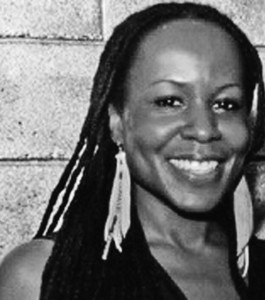

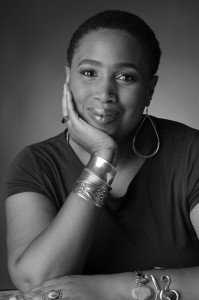
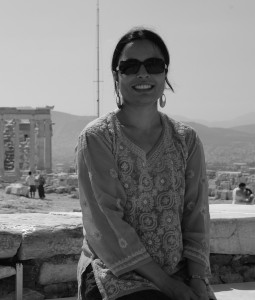
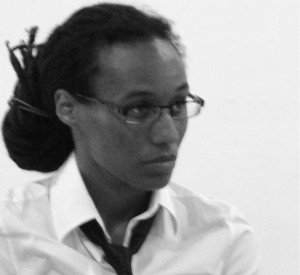

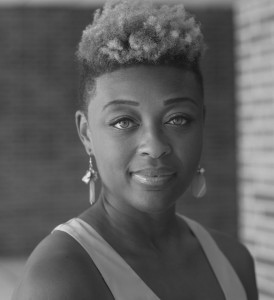
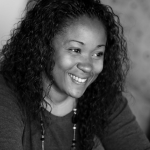


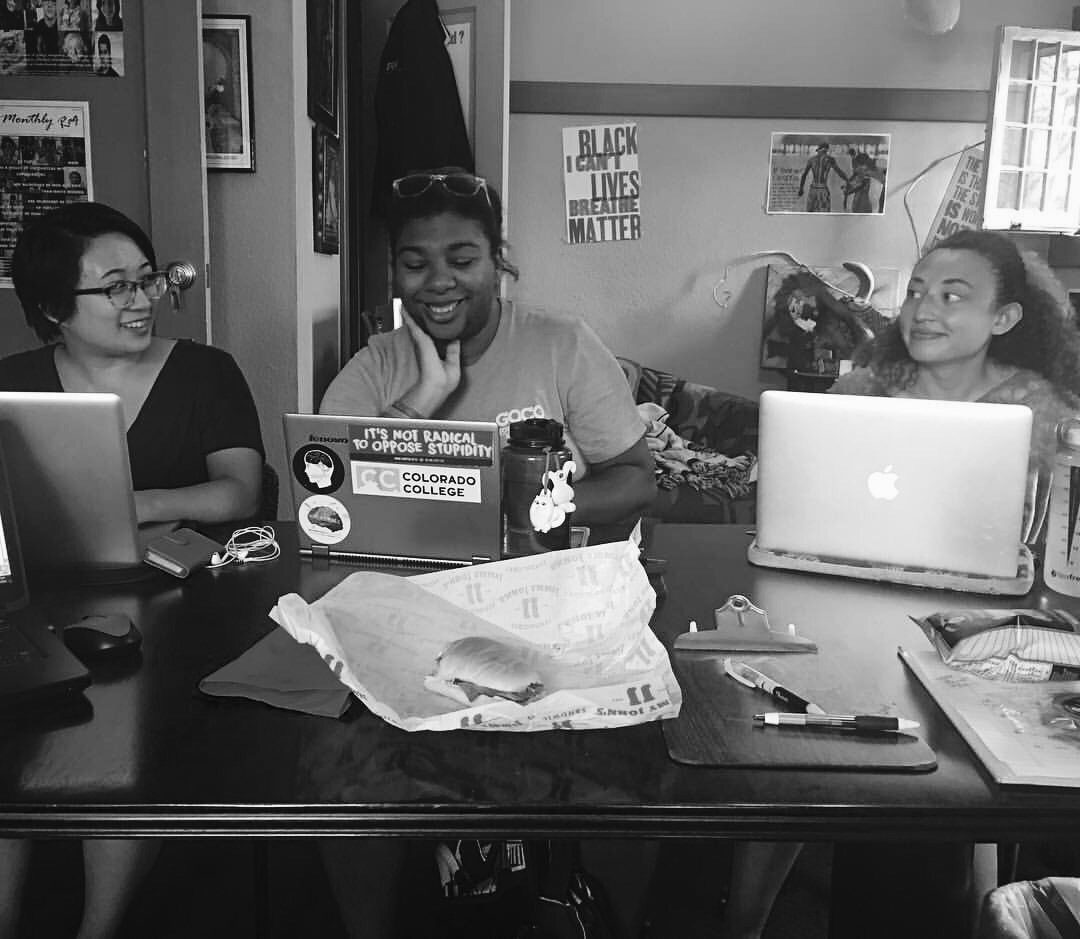
0 comments